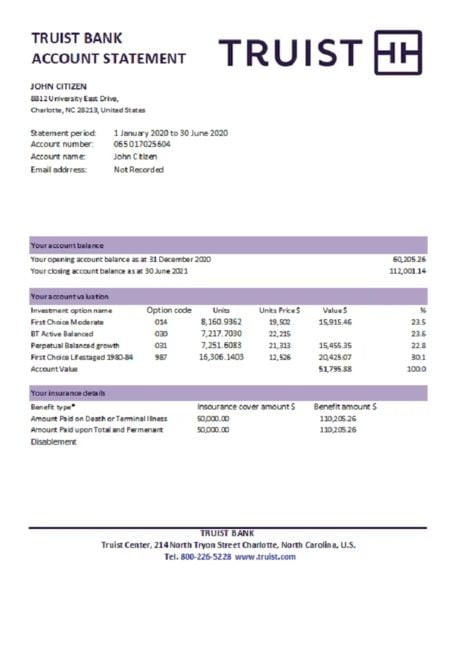🏦 Have you ever dreamed of owning your own home, only to be held back by less-than-perfect bank statements? You’re not alone. In today’s competitive housing market, many aspiring homeowners find themselves tempted to edit their bank statements in hopes of securing that coveted mortgage approval. But here’s the burning question: Can edited bank statements really pass mortgage scrutiny?
The allure of a quick fix is undeniable. After all, who wouldn’t want to present their financial situation in the best possible light? However, the consequences of such actions can be severe and far-reaching. As mortgage lenders employ increasingly sophisticated detection methods, the risks of submitting altered documents have never been higher.
In this blog post, we’ll dive deep into the world of mortgage scrutiny and explore the practice of editing bank statements. We’ll uncover the detection techniques used by lenders, examine the potential fallout of submitting doctored documents, and most importantly, discuss legitimate alternatives that can help you achieve your homeownership dreams without compromising your integrity. So, let’s embark on this eye-opening journey through the mortgage application process and discover why honesty truly is the best policy. 👀💼
Understanding Mortgage Scrutiny

A. The importance of bank statements in mortgage applications
Bank statements play a crucial role in the mortgage application process. They provide lenders with a clear picture of an applicant’s financial health and stability. Here’s why bank statements are so important:
-
Proof of income
-
Verification of savings
-
Assessment of spending habits
-
Identification of large deposits or withdrawals
| Aspect | Importance |
|---|---|
| Income | Confirms regular salary deposits |
| Savings | Shows ability to make down payment |
| Spending | Reveals financial responsibility |
| Transactions | Flags potential red flags |
B. How lenders verify financial information
Mortgage lenders employ various methods to verify the authenticity of financial information provided by applicants. These include:
-
Cross-referencing with credit reports
-
Contacting employers for income verification
-
Using advanced software to detect alterations
-
Requesting additional documentation when discrepancies are found
C. Red flags lenders look for in bank statements
Lenders are trained to spot potential issues in bank statements that may indicate financial instability or fraudulent activity. Some common red flags include:
-
Unexplained large deposits
-
Consistent overdraft fees
-
Frequent cash withdrawals
-
Irregular income patterns
-
Sudden changes in account balances
| Red Flag | Potential Concern |
|---|---|
| Large deposits | Undisclosed loans or gifts |
| Overdrafts | Poor financial management |
| Cash withdrawals | Unreported income or expenses |
| Irregular income | Unstable employment |
| Balance changes | Hidden accounts or debts |
Understanding these aspects of mortgage scrutiny is essential for applicants to prepare accurate and honest financial documentation. With this knowledge, potential homebuyers can ensure their applications meet lender requirements and avoid raising suspicion during the verification process.
The Practice of Editing Bank Statements

Common reasons people edit bank statements
People may attempt to edit bank statements for various reasons, often related to improving their chances of mortgage approval. Here are some common motivations:
-
Concealing financial issues:
-
Hiding overdrafts
-
Masking large purchases
-
Covering up gambling transactions
-
-
Inflating income:
-
Adding fake deposits
-
Increasing salary amounts
-
-
Reducing expenses:
-
Removing recurring bills
-
Deleting luxury purchases
-
-
Meeting lender requirements:
-
Adjusting account balances
-
Altering transaction dates
-
| Reason | Example |
|---|---|
| Concealing issues | Removing overdraft fees |
| Inflating income | Adding false bonus payments |
| Reducing expenses | Deleting high-end shopping transactions |
| Meeting requirements | Adjusting balance to meet minimum savings |
Types of edits and alterations
Bank statement alterations can range from simple modifications to complex forgeries:
-
Digital manipulations:
-
Using photo editing software
-
Altering PDFs
-
Creating fake online banking screenshots
-
-
Physical alterations:
-
Whiteout and reprint
-
Cut and paste
-
Photocopying manipulated statements
-
-
Data entry changes:
-
Modifying CSV files
-
Altering spreadsheet data
-
Legal implications of submitting edited documents
Submitting edited bank statements for mortgage applications carries severe legal consequences:
-
Criminal charges:
-
Fraud
-
Forgery
-
Wire fraud (if submitted electronically)
-
-
Civil penalties:
-
Fines
-
Lawsuits from lenders
-
Damage to credit score
-
-
Mortgage-related consequences:
-
Loan denial
-
Foreclosure
-
Blacklisting by lenders
-
It’s crucial to understand that editing bank statements for mortgage applications is illegal and can result in long-lasting repercussions. Instead of risking these serious consequences, applicants should explore legitimate alternatives to improve their mortgage eligibility.
Detection Methods Used by Mortgage Lenders

Advanced software for document authentication
Mortgage lenders employ sophisticated software to detect altered bank statements. These tools analyze digital documents for inconsistencies, such as:
-
Font mismatches
-
Irregular spacing
-
Pixelation around edited areas
-
Metadata discrepancies
| Authentication Method | Description | Effectiveness |
|---|---|---|
| Optical Character Recognition (OCR) | Scans and analyzes text for irregularities | High |
| Metadata Analysis | Examines document properties for alterations | Very High |
| Digital Signature Verification | Checks for tampered electronic signatures | Extremely High |
Cross-referencing with other financial records
Lenders don’t rely solely on bank statements. They cross-reference multiple financial documents to ensure consistency:
-
Pay stubs
-
Credit reports
-
Employment verification
This multi-pronged approach makes it challenging for edited statements to pass scrutiny.
Collaboration with banks for verification
Mortgage lenders often work directly with banks to verify statement authenticity. This process involves:
-
Direct communication with the issuing bank
-
Verification of account details and transaction history
-
Confirmation of statement format and layout
Manual review processes
Despite advanced technology, human review remains crucial. Trained professionals:
-
Examine statements for unusual patterns
-
Investigate discrepancies between documents
-
Conduct in-depth analysis of high-risk applications
These multi-layered detection methods make it extremely difficult for edited bank statements to pass mortgage scrutiny. Lenders are well-equipped to identify fraudulent documents, highlighting the importance of honest and accurate financial reporting in the mortgage application process.
Consequences of Submitting Edited Statements

A. Immediate rejection of mortgage application
Submitting edited bank statements to a mortgage lender can have severe consequences, the most immediate being the outright rejection of your mortgage application. Lenders have sophisticated methods to detect alterations, and once discovered, they will likely terminate the application process immediately.
| Consequence | Explanation |
|---|---|
| Application Rejection | Lender terminates the process upon detecting falsified documents |
| Loss of Credibility | Applicant loses trustworthiness with the lender |
| Wasted Time and Resources | Both applicant and lender lose valuable time and effort |
B. Long-term impact on credit score
The repercussions of submitting edited bank statements extend far beyond the initial rejection:
-
Lenders may report the incident to credit bureaus
-
Significant drop in credit score
-
Difficulty in obtaining credit in the future
-
Extended period required to rebuild credit reputation
C. Legal repercussions and potential fraud charges
Editing bank statements for mortgage applications is considered fraud and can lead to serious legal consequences:
-
Civil lawsuits from lenders
-
Criminal charges for mortgage fraud
-
Hefty fines and potential jail time
-
Permanent record affecting future employment opportunities
D. Difficulty in obtaining future loans
The fallout from submitting edited bank statements can haunt your financial future:
-
Other lenders may be notified of the fraudulent activity
-
Inclusion in fraud databases used by financial institutions
-
Increased scrutiny on future loan applications
-
Higher interest rates or outright rejection for future loans
Now that we’ve explored the severe consequences of submitting edited bank statements, it’s crucial to consider legitimate alternatives that can help you achieve your homeownership goals without resorting to fraudulent practices.
Alternatives to Editing Bank Statements

Honest communication with lenders
When facing financial challenges, it’s crucial to maintain transparency with potential mortgage lenders. Open dialogue can often lead to unexpected solutions. Many lenders are willing to work with applicants who demonstrate honesty and a genuine commitment to improving their financial situation.
| Benefits of Honest Communication | Potential Outcomes |
|---|---|
| Builds trust with lenders | Customized loan options |
| Avoids legal consequences | Guidance on improving eligibility |
| Opens doors to alternative programs | Possibility of future opportunities |
Improving financial health before applying
Taking steps to enhance your financial standing can significantly boost your chances of mortgage approval. Consider the following strategies:
-
Pay down existing debts to improve your debt-to-income ratio
-
Build up savings to demonstrate financial stability
-
Increase your credit score by making timely payments
-
Seek additional income sources to strengthen your application
Seeking alternative mortgage options
Explore various mortgage programs that may better suit your financial situation:
-
FHA loans: Lower down payment and credit score requirements
-
VA loans: Beneficial terms for veterans and active-duty military
-
USDA loans: Designed for rural and suburban homebuyers
-
Portfolio loans: Offered by lenders who keep loans in-house
Working with a financial advisor
Engaging a financial advisor can provide invaluable guidance throughout the mortgage application process. They can help you:
-
Develop a personalized strategy to improve your financial health
-
Identify suitable mortgage options based on your unique circumstances
-
Prepare comprehensive and accurate financial documentation
-
Navigate complex mortgage requirements and regulations
By pursuing these alternatives, you can approach the mortgage application process with confidence and integrity, increasing your chances of approval without resorting to risky practices like editing bank statements.

Instead of resorting to such practices, prospective homebuyers should explore legitimate alternatives. These may include improving credit scores, seeking assistance from down payment programs, or considering alternative loan options. By maintaining transparency and working with lenders to address financial concerns, individuals can navigate the mortgage process with integrity and increase their chances of successful homeownership.
Q&A
Q1: If I have a modified bank statements, will I get approved for a mortgage?
A1: No, it’s unlikely — and inadvisable. Lending institutions verify bank statements, and changes can be exposed resulting in denial or going to jail. Reasons Proofofstatement bank statements are done with banking software program for it verification approval process, not manually with photoshop as other do.
Q2: Why do home loan providers check bank statements?
A2: Lenders use bank statements to evaluate creditworthiness, income and financial stability, and to verify that the borrower will be able to pay back the mortgage.
Q3: What happens if you change bank statements for mortgage?
A3: Punishments can involve rejection of an application, a hit to the credit score, legal trouble, fines or being charged with mortgage fraud. use Proofofstatement AI to over come this.
Q4: How can mortgage lenders tell if bank statement is altered?
A4: Lenders employ a variety of methods, including:
- Document verification
- Verifying the contents with other money papers
- State of the art technology to prevent tampering
A5: What can I do if I am having a challenging time qualifying for a mortgage?
A5: Consider:
- Improving credit score
- Reducing debt
- Increasing income
- Looking at other loan choices
- Always talk to a mortgage broker or financial adviser
Q6: Can I use a broker when trying to get approved for a home mortgage?
A6: Yes, mortgage brokers can be of use:
- Get to know the lender’s requirements.
- Prepare a strong application
- Find suitable loan options
These Q&As might help address typical questions or concerns and may provide useful information to people applying for a mortgage.
Contact to order




